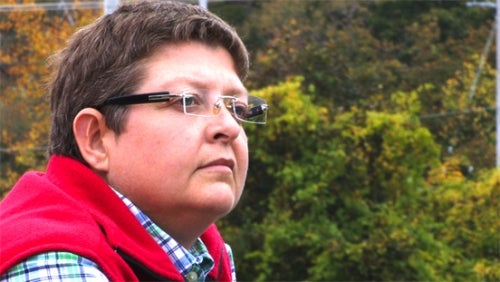Things that were once easy for Mary Beth Wighton, like remembering the four-digit pin on her debit card, are now a challenge. In 2012, at the age of 45, Wighton was diagnosed with frontotemporal dementia, a rare form of dementia with no cure.

“I’d known for years there was something seriously wrong with me and that it was not depression. I just didn’t know what it was,” said Wighton.
Today Wighton is one of more than 747,000 Canadians living with dementia— an umbrella term for a wide range of symptoms associated with a decline in memory or cognitive skills severe enough to reduce a person's ability to perform everyday activities. By 2031, that figure is expected to double.
“Although more people may be diagnosed with dementia in the next several years, it doesn’t mean that life is over,” said Jessica Luh, associate director of education for the Murray Alzheimer Research and Education Program (MAREP) at Waterloo. “There is a common perception that a diagnosis of dementia means life has ended. That simply isn’t true.”
Video series challenges stereotypes
After her diagnosis, Wighton turned to MAREP’s suite of educational resources to learn how she could continue to lead a productive, meaningful life. Now the Kitchener-native is the subject of a new video series that challenges stigmas and stereotypes and offers new hope for those diagnosed with the disease.
Produced by Montreal-based director Chris Wynn, A New Voice: living well with dementia, follows Wighton as she meets three individuals living with dementia and learns the tools and strategies they use in their everyday lives.
“As someone newly diagnosed with dementia, it was important for me to know that this was not game over. The people I met while filming the series gave me new hope and showed me that I can not only cope, but thrive,” said Wighton.
Like all of MAREP’s resources, the video series is based on an authentic partnership approach, which includes those living with dementia, their family members and care partners, in the creation of practical tools.
The end result puts a new lens on the dementia journey.
“We are the ones living with dementia. So we, more than anyone, are the experts on how to live well,” said Wighton.
Need for a national strategy
For Wighton, part of living well includes advocating for a national dementia strategy. As it stands, Canada is the only G8 country without one.
“Program and policy developers need us at the table to help educate and make the critical decisions that will affect us directly. People with dementia have a voice. We just need to be heard,” she said.
A New Voice: living well with dementia can be purchased on MAREP's website for $35.00 plus HST. All proceeds go to the development of additional educational tools.